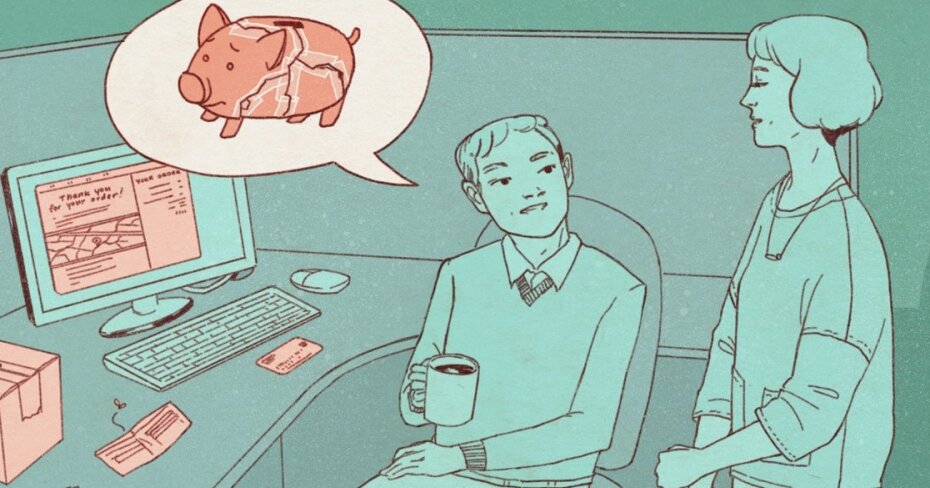Thinking you’re 'bad with money' can become a self-fulfilling prophecy
By: Lisa Coxon on October 22, 2019
In 1948, an American sociologist by the name of Robert K. Merton coined the term “self-fulfilling prophecy.”
As Merton described it, a self-fulfilling prophecy is “a false definition of the situation evoking a new behavior which makes the originally false conception come true.”
In other words, self-fulfilling prophecies occur when a false belief causes your behaviours to eventually align with that belief. It might sound a little out-there, but this concept is actually a pretty well-studied phenomenon and has arisen in all sorts of areas, including social psychology, studies on pain, and even in the educational sector.
The self-fulfilling prophecy can also rear its head in the world of personal finance. When people believe something about themselves — like that they’re not savvy or responsible with money — it’s not unusual for them to start behaving in ways that reinforce that belief.
Shannon Lee Simmons, a certified financial planner and founder of the New School of Finance in Toronto, not only touches on this concept in her latest book Living Debt Free; she regularly sees it play out in her work. Simmons has watched clients tell her that they’re inherently “bad with money”, and then behave in ways that are financially reckless. They might take on more credit than they can handle, for instance, or stop trying to save money altogether.
These financially irresponsible behaviours become “proof” for that person that they were right about themselves all along (even when they weren’t). And so people find themselves in a harmful, self-fulfilling prophecy.
“I’m bad with money”
When meeting with new clients — especially those with debt — Simmons will often hear the phrase, “I’m bad with money.”
“I think every person who has debt will say it,” says Simmons. “And what’s surprising to me is that even people who don’t have debt, like the people who are like really rockin’ it, there’s still that uncertainty that they feel like they should be doing more.”
One of her employees, certified financial planner Liz Schieck, sees it, too. “When people come in for meetings, we almost always ask them: what are you hoping to get out of this session? And at least 75 to 80% of people say, ‘Well, I'm terrible with money.’ It’s the first thing people say."
But what are people really getting at when they say they’re “bad with money”?
“There's a feeling of scatteredness and that nothing is on purpose,” says Simmons. “That’s at the core — that there’s no strategy. And so it feels fruitless and maybe hopeless, like there is no guidance or plan.”
And if someone’s given up on their finances, well, then it’s a free-for-all, right?
Those feelings don’t just appear out of thin air, either. They’re usually ignited when people are carrying debt, when there’s some sort of “intergenerational transfer” of financial habits or financial beliefs — such as growing up with parents who were irresponsible with money and being scared the same habits are in your fate — or when a parent or partner tells you that you’re bad with money.
And once someone adopts this mentality, Simmons says, it’s not unusual for them to act in accordance with it.
“It’s a shame spiral that leads to not trying,” she says. “Especially where debt is concerned.”
For example, someone with debt might try to embark on a repayment plan — and fail. And they might try again, and again — and fail. Those failures will reinforce the belief that they were right from the get-go and are inherently terrible with money. They might then stop trying to be “good” with money at all, which could result in missed payments or taking on new debt while trying to pay back a large amount. And the cycle continues.
“If you fundamentally believe that you’re a person that’s just missing that gene and you’re just bad with money, what you are actually fundamentally saying is: no matter what I do, I will end up in this position, so why would I bother?”
“And if someone’s given up on their finances,” Simmons says, “well, then it’s a free-for-all, right?”
Self-imposed reference points
We can’t talk about being bad with money, however, without also talking about how we make that judgment.
“We want to question the notion of how much we even know about how good or bad we are with money,” says Avni Shah, an assistant professor of marketing in the department of management at the University of Toronto Scarborough and a research fellow of the Behavioural Economics in Action Research Cluster.
“Do we have markers that say we’re making very good decisions with our money?”
We do, but those markers are ones we create ourselves, based on how we interpret those around us are doing financially. For instance, if our neighbours just bought a brand new Tesla, we might dub that a marker of financial well-being and consider ourselves below it if we don’t also own a new vehicle of the same caliber.
But, says Shah, “It’s very hard to track how people are doing. I don't know that that person over there has tons of debt. I just see outcomes. You don’t know people’s assets and all of their liabilities. You don’t know if they’re underwater or not.”
You don’t know people’s assets and all of their liabilities. You don’t know if they’re underwater or not
That makes it even more challenging to assess how we’re really “doing” with money at all. Worse yet, when we believe something about ourselves, we’re going to do everything we can to try and find reinforcement for that belief — even if it means sabotaging our financial well-being.
“When someone says ‘I'm bad at finances,’ they’re likely to look at confirmatory signals,” says Shah. Like the neighbours’ new Tesla or the three vacations your coworker took last year.
We create a self-imposed reference point for where we think we should be, then we look for confirmation that we are indeed not where we should be, and then we might even become more reckless with our finances because of it.
That’s because of an economic concept called “prospect theory,” which was developed by Daniel Kahneman and Amos Tversky in 1979. Prospect theory, Shah explains, has shown us that we feel losses more than we feel gains. “And people will so badly want to get to a reference point that they’ll actually take increased risks to feel some sort of gain.”
So if someone thinks they’re doing worse than everybody else and that they can’t fix it, they might become more susceptible to risky behaviour, such as making imprudent investments or only thinking in the moment. “Instead of worrying about my future,” says Shah, “I’m just going to maximize what will make me feel good today.”
It’s also important to remember, Shah says, that “financial choices aren’t natural. They take effort and planning and attention. And if a person believes that they’re just not the type or they believe that they’re not going to ever remedy their situation, then it’s very easy to act in a way that's more myopic or present-biased and not plan for the future because there’s a belief that I’m already doomed so why not just behave in ways that will punish myself even further?”
How can we stop the self-fulfilling prophecy?
If we know that negative self-talk and self-beliefs around money can actually lead to us making poor financial decisions, how can we stop the prophecy from playing out?
Simmons likes to start by reframing her clients’ stories. “Most people don’t get into debt because they have an expensive purse problem or an action figurine issue,” she says. “What gets most people into debt the first time is usually circumstantial. Like you got laid off, or someone got sick… and then you couldn't get out of it. I usually try to remind people about how this started in the first place. And that takes the sting out of it.”
If we all actually talked about and realized how many of our peers are actually carrying a rolling $5,000 on a credit card, cause I can tell ya, I see it every day
Next, she tries to offer some hope, which might involve showing her clients how much of an impact something like $100 a month can really have on a big debt balance. “Instilling a little bit of hope can light a fire under someone’s butt that maybe wasn’t there before,” says Simmons.
Finally, she makes sure that the repayment plan she puts in place for her clients is realistic. “The other thing that makes people stop wanting to do things is that they expect that if they’re going to get their financial life in order, it means they can never get a coffee again or go on a trip — nothing. So it’s a punishment. And when your financial plan is a punishment, people are going to avoid it.”
But the most effective way to smash the prophecy is to talk about it. There’s a silly amount of stigma around being “bad with money” but if you air your concerns in a safe space, like with a professional, it can bring about some perspective.
“Breaking that stigma around debt is hugely important for people to not feel bad with money,” says Simmons. “Because it normalizes it. If we all actually talked about and realized how many of our peers are actually carrying a rolling $5,000 on a credit card, cause I can tell ya, I see it every day.”
Is there ever a situation where negative self-talk can have a positive effect on someone’s financial behaviours?
“I think a healthy dose of fear is good,” says Simmons. “Nobody wants to be the grasshopper who sang all summer. ‘I need to get my financial house in order’ is a different statement, however, than ‘I’m bad with money.’ Getting real with yourself is great. But being mean to yourself is a totally different thing.”
Illustration by Taryn Gee.


